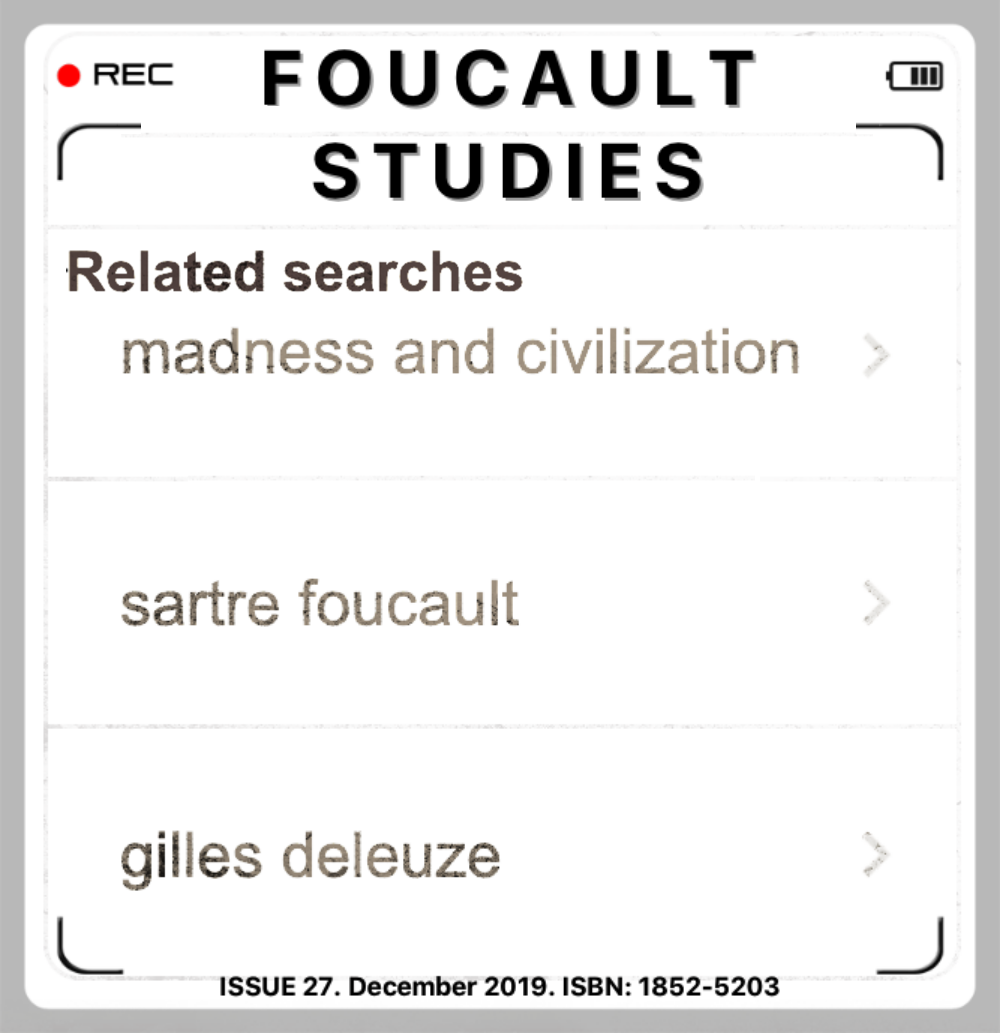Ethical Invention in Sartre and Foucault: Courage, Freedom, Transformation
DOI:
https://doi.org/10.22439/fs.v27i27.5893Abstract
This article explores the concept of ethical invention in both Jean-Paul Sartre’s and Michel Foucault’s later lectures and interviews, showing that a courageous disposition to invent or transform plays a key role in both thinkers’ visions of ethics. Three of Sartre’s post-Critique of Dialectical Reason lectures on ethics are examined: Morality and History, The Rome Lecture, and A Plea for Intellectuals. It is shown that ethical invention for Sartre requires the use of our freedom to transcend our current circumstances, a willingness to break away from harmful ideologies, and directing our free praxis towards the goal of universal humanism. Examining several of Foucault’s interviews alongside his lecture series The Government of Self and Others and The Courage of Truth, it is shown that ethical invention for Foucault requires a rejection of necessities or inevitabilities in our current landscape, a willingness to reshape our current beliefs, and a philosophical way of life that results in an alteration of the relationship to self and others. For both thinkers, ethical invention should be preceded by a critical reflection on ourselves in our historical moment. Both argue that ethical invention requires a rejection of the inherent value of our world and realization that the conditions of possibility for being subjects are malleable. Last, it is shown that both philosophers specifically call philosophers or intellectuals to invent.
Literaturhinweise
Flynn, Thomas, Sartre, Foucault, and Historical Reason, Volume One: Towards an Existentialist Theory of History. Chicago: University of Chicago Press, 1997: https://doi.org/10.7208/chicago/9780226254692.001.0001
Flynn, Thomas, Sartre, Foucault and Historical Reason, Volume Two: A Post-Structuralist Mapping of History. Chicago: University of Chicago Press, 2005: https://doi.org/10.7208/chicago/9780226254722.001.0001
Flynn, Thomas, Sartre and Marxist Existentialism. Chicago: University of Chicago Press, 1984.
Foucault, Michel, The Archaeology of Knowledge and the Discourse on Language [1969], trans. Alan Sheridan. New York: Pantheon Books, 1972.
Foucault, Michel, The Courage of Truth: The Government of Self and Others II, Lectures at Collège de France, 1983-1984, trans. Graham Burchell. New York: Palgrave McMillan, 2011.
Foucault, Michel, Discipline and Punish [1975], trans. Alan Sheridan. New York: Randomhouse, 1977.
Foucault, Michel, Dits et Écrits Vol. II: 1976–1988, ed. Daniel Defert and François Ewald. Paris: Gallimard, 2013.
Foucault, Michel, The Government of Self and Others: Lectures at Collège de France, 1982-1983, trans. Graham Burchell. New York: Palgrave Macmillan, 2010.
Foucault, Michel, The History of Sexuality Volume 1 [1976], trans. Robert Hurley. New York: Vintage Books, 1990.
Foucault, Michel, “Interview with C. Bonnefoy” [1966], in Dits et écrits, Vol I: 1954-1975, ed. Daniel Defert and François Ewald. Paris: Gallimard, 2001.
Foucault, Michel, “Interview with Madeline Chapsal” [1966], in Dits et écrits, Vol I: 1954- 1975, ed. Daniel Defert and François Ewald. Paris: Gallimard, 2001.
Foucault, Michel, "Interview with Michel Foucault” [1978] in The Essential Works of Michel Foucault 1954-1984. Volume Three: Power, ed. J. Faubion, trans. Robert Hurley. New York: New Press, 2000.
Foucault, Michel, The Order of Things: An Archaeology of the Human Sciences [1966]. New York: Vintage Books, 1994.
Foucault, Michel, “Power, Moral Values, and the Intellectual: Interview with Michael Bess” [1980] in History of the Present 4 (1988), 1-2, 11-13.
Foucault, Michel, “Truth, Power, Self” [1982], in Technologies of the Self: A Seminar with Michel Foucault, ed. Luther Martin, Huck Gutman, and Patrick Hutton. Amherst: University of Massachusetts Press, 1988.
Foucault, Michel, “What is Enlightenment?” in The Foucault Reader, ed. Paul Rabinow. New York: Randomhouse, 1984.
Klockars, Kristian, Sartre’s Anthropology as a Hermeneutics of Praxis. Farnham, UK: Ashgate Publishing, 1998.
Koopman, Collin, “The Formation and Self-Transformation of the Subject in Foucault’s Ethics” in A Companion to Foucault, ed. Christopher Falzon, Timothy O’Learly, and Jana Sawicki. Wiley and Blackwell, 2013: https://doi.org/10.1002/9781118324905.ch27
Sartre, Jean-Paul, Being and Nothingness [1943], trans. by Hazel Barnes. New York: Philosophical Library, 1956.
Sartre, Jean-Paul, Critique of Dialectical Reason, Vol. 1: Theory of Practical Ensembles [1960], Translated by Alan Sheridan-Smith. New York: Verso, 2004.
Sartre, Jean-Paul, The Itinerary of Thought [1969]. In Between Marxism and Existentialism, trans. John Matthews. New York: Pantheon Books, 1974.
Sartre, Jean-Paul, “A Plea for Intellectuals” [1972], in Between Marxism and Existentialism, trans. John Matthews. New York: Pantheon Books, 1974.
Sartre, Jean-Paul, Morality and History [1965], excerpts found in Robert Stone and Elizabeth Bowman “Sartre’s Morality and History: A First Look at the Notes of the Unpublished 1965 Cornell Lecture,” in Sartre Alive, ed. Ron Aronson and Adrian Van den Hoven. Detroit: Wayne State University Press, 1991, 53-82.
Sartre, Jean Paul, The Rome Lecture Notes. Prepared for “Ethics and Society” at Institut Gramsci on May 23, 1964. Translated by Robert Stone and Elizabeth Bowman. Accessed September 7-20 2015 at Bibliothèque Nationale in Paris, France.
Stone, Robert, and Elizabeth Bowman, “Sartre’s Morality and History: A First Look at the Notes for the Unpublished 1965 Cornell Lecture,” in Sartre Alive, ed. Ron Aronson and Adrian Van den Hoven. Detroit: Wayne State University Press, 1991, 53-82.
Downloads
Veröffentlicht
Zitationsvorschlag
Ausgabe
Rubrik
Lizenz
Authors retain copyright to their work, but assign the right of the first publication to Foucault Studies. The work is subject to a CC BY-NC-ND 4.0 license, but despite these restrictions, authors can take for granted that Foucault Studies will permit articles published in Foucault Studies to be translated or reprinted in another format such as a book providing a full reference is made to Foucault Studies as the original place of publication.



